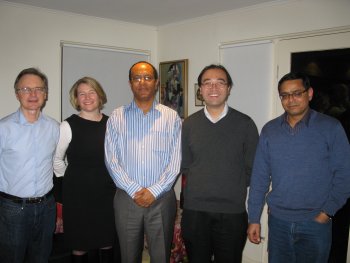The clinical preceptorship program: experience from the receiving end
 When we first started to develop our priorities for the International CML Foundation we thought that education and training for clinicians from the emerging regions would be an area where we could make a substantial impact in a cost-effective manner. I think this has proved to be the case - the clinical preceptorship program has exceeded our expectations when we look at what has already been achieved. So far over 40 haematologists and pathologists from 25 emerging countries have received a 3-4 week training session at one of 10 premier CML centres. In Adelaide we have had the pleasure of working with 9 haematologists from 6 countries over the first 2 years of the program.
When we first started to develop our priorities for the International CML Foundation we thought that education and training for clinicians from the emerging regions would be an area where we could make a substantial impact in a cost-effective manner. I think this has proved to be the case - the clinical preceptorship program has exceeded our expectations when we look at what has already been achieved. So far over 40 haematologists and pathologists from 25 emerging countries have received a 3-4 week training session at one of 10 premier CML centres. In Adelaide we have had the pleasure of working with 9 haematologists from 6 countries over the first 2 years of the program.
The feedback from the preceptors has been overwhelmingly positive as can be seen from first hand accounts in this newsletter and on the website. However what I wasn’t expecting was the positive feedback I have received from my colleagues in Adelaide and at the other CML centres. I have been surprised by how rewarding this program has been for us as well. Working closely with haematologists who have successfully managed large cohorts of CML patients with limited resources and difficult conditions has been inspirational. Rather than the one-way transfer of information and skills that we envisaged when the program was set up, there has been an exchange of ideas and experiences that will be mutually beneficial. The opportunity to collaborate with key clinicians in the emerging regions has already led to partnerships being formed between preceptors and their host clinicians. These partnerships might be established initially to facilitate PCR standardisation or sample exchanges but can grow into clinical and research collaborations looking, for instance, at resistance patterns in different regions or comparing drug adherence across different cultures. We saw further evidence of the partnerships that are developing when we reviewed the 30+ applications we received for our diagnosis and monitoring program. Over half of these applications included a commitment from an expert CML centre to support the project that could be traced back to a collaboration established through the preceptorship program.
 On a personal level the preceptorship program has enabled me to develop friendships with a remarkable group of clinicians from around the world who battle local challenges and limited funding to provide the best possible care for their CML patients.
On a personal level the preceptorship program has enabled me to develop friendships with a remarkable group of clinicians from around the world who battle local challenges and limited funding to provide the best possible care for their CML patients.
When developing the preceptorship program we debated the relative merits of selecting junior clinicians with limited experience and limited access to international meetings versus senior clinicians with large CML practices and significant local influence. The argument in favour of selecting junior candidates was the opportunity to give a clinician with limited experience an intensive course in CML management that would improve his/her local practice significantly with consequent long-term benefits to his community. The attraction of selecting senior clinicians is that the “pupil” can become the master when they return to their country so that one person well trained could lead to many clinicians then receiving excellent costeffective training locally. Both strategies have merit and we have tended to select a mix of the two types of candidates.
Our enthusiasm for the clinical preceptorship program has led us to our next program – preceptorships for laboratory clinicians and scientists that will focus on developing the skills to enable molecular monitoring to be set up locally in ERSAP regions. I look forward to an equally satisfying experience developing partnerships and collaborations with these preceptors over the next few years.
Professor Tim Hughes
Head of Hematology SA Pathology, Royal Adelaide Hospital










